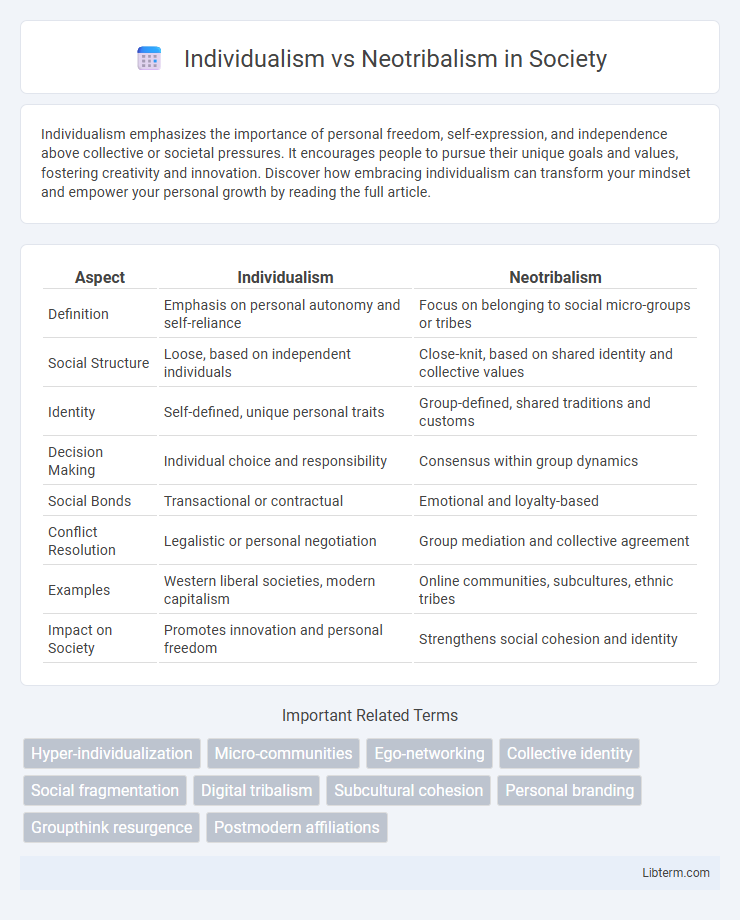Individualism emphasizes the importance of personal freedom, self-expression, and independence above collective or societal pressures. It encourages people to pursue their unique goals and values, fostering creativity and innovation. Discover how embracing individualism can transform your mindset and empower your personal growth by reading the full article.
Table of Comparison
| Aspect | Individualism | Neotribalism |
|---|---|---|
| Definition | Emphasis on personal autonomy and self-reliance | Focus on belonging to social micro-groups or tribes |
| Social Structure | Loose, based on independent individuals | Close-knit, based on shared identity and collective values |
| Identity | Self-defined, unique personal traits | Group-defined, shared traditions and customs |
| Decision Making | Individual choice and responsibility | Consensus within group dynamics |
| Social Bonds | Transactional or contractual | Emotional and loyalty-based |
| Conflict Resolution | Legalistic or personal negotiation | Group mediation and collective agreement |
| Examples | Western liberal societies, modern capitalism | Online communities, subcultures, ethnic tribes |
| Impact on Society | Promotes innovation and personal freedom | Strengthens social cohesion and identity |
Understanding Individualism: Core Principles
Individualism emphasizes personal autonomy, self-reliance, and the pursuit of individual goals as essential for human fulfillment and societal progress. It values freedom of choice, personal responsibility, and the development of unique identity over collective conformity. These core principles prioritize the individual's rights and independence within social and political frameworks.
The Rise of Neotribalism: A Modern Context
The rise of neotribalism reflects a shift from traditional individualism towards a greater emphasis on group identity and social belonging in contemporary society. Neotribalism fosters collective loyalty through shared interests, cultural markers, and digital communities, reshaping social dynamics in an increasingly interconnected world. This trend highlights the interplay between modern technology, identity politics, and social cohesion in redefining personal and communal values.
Historical Evolution of Social Identity
The historical evolution of social identity reveals a shift from individualism, emphasizing personal autonomy and self-expression, to neotribalism, where individuals seek belonging within small, closely-knit groups resembling tribes. In modern societies, individualism emerged prominently during the Enlightenment, fostering personal rights and independence, while neotribalism resurged due to globalization and digital connectivity, motivating people to form micro-communities based on shared values and interests. This transition highlights the dynamic nature of social identity, influenced by cultural, technological, and economic changes across history.
Individualism and Personal Autonomy
Individualism emphasizes personal autonomy, valuing self-reliance and individual rights as essential to human freedom. It promotes the belief that individuals have the inherent capacity to make independent choices and shape their own destinies. This philosophy underpins modern liberal democracies and influences diverse fields such as psychology, where personal identity and self-expression are prioritized.
Neotribalism: Community in the Digital Age
Neotribalism redefines community in the digital age by fostering interconnectedness through online platforms where individuals find belonging within fluid, interest-based groups rather than traditional, fixed identities. This modern tribalism emphasizes shared values and collective experiences, creating dynamic social networks that transcend geographical boundaries. Digital neotribal communities enhance social cohesion by enabling personalized, yet communal interactions, reflecting a shift from individualism toward relational identity construction.
Social Cohesion vs. Personal Freedom
Neotribalism emphasizes social cohesion through small, close-knit communities that provide individuals with a strong sense of belonging and shared identity. In contrast, individualism prioritizes personal freedom and autonomy, encouraging self-expression and independent decision-making. Balancing these dynamics involves managing the tension between collective group loyalty and the protection of individual rights.
Identity Formation in Individualist vs. Neotribal Societies
Identity formation in individualist societies centers on personal autonomy, self-expression, and individual achievements, emphasizing unique traits and personal goals. In contrast, neotribal societies shape identity through collective belonging, shared rituals, and group loyalties, fostering a sense of interconnectedness and mutual support within social tribes. These contrasting approaches influence social behavior, psychological well-being, and community engagement patterns in their respective cultures.
Psychological Impacts of Individualism and Neotribalism
Individualism promotes autonomy, self-expression, and personal achievement, fostering psychological well-being through a strong sense of identity and self-efficacy. In contrast, neotribalism emphasizes belonging, social cohesion, and collective identity, which can enhance emotional support but may also limit individual autonomy and increase conformity pressure. The psychological impacts of these paradigms influence mental health outcomes, with individualism linked to higher self-esteem yet increased feelings of isolation, while neotribalism offers social connectedness but risks identity diffusion.
Cultural Shifts: From Lone Wolves to Digital Tribes
Cultural shifts from individualism to neotribalism highlight a transition from isolated lone wolves to interconnected digital tribes centered around shared interests and values. This evolution reflects changes in social dynamics enabled by online platforms, where identity and community are redefined through collective digital experiences. The rise of digital tribes challenges traditional notions of autonomy, emphasizing collaborative belonging and cultural cohesion in virtual spaces.
Future Trends: Balancing Individual Rights and Collective Belonging
Future trends in individualism versus neotribalism emphasize the dynamic interplay between personal autonomy and the human need for social connection, where technological advancements enable customized identities while fostering interconnected digital communities. Emerging social structures prioritize hybrid models that integrate individual rights with collective belonging, promoting inclusive networks that respect diversity yet maintain group cohesion. This balance challenges traditional paradigms by encouraging flexible, context-dependent affiliations, leveraging data-driven insights to support both self-expression and collaborative engagement.
Individualism Infographic

 libterm.com
libterm.com